Should You Choose Ghee or Butter? The Complete Health Comparison
From ancient kitchens to modern ones, ghee and butter are essential cooking ingredients. Though they both come from milk, they differ in taste, preparation process, and health benefits. Both fats are healthy, but it's a never-ending question: which is healthier—ghee or butter?
Let's compare them and uncover the truth so that you can choose the best fat for your cooking and dietary needs.
What's Really Inside Ghee and Butter?
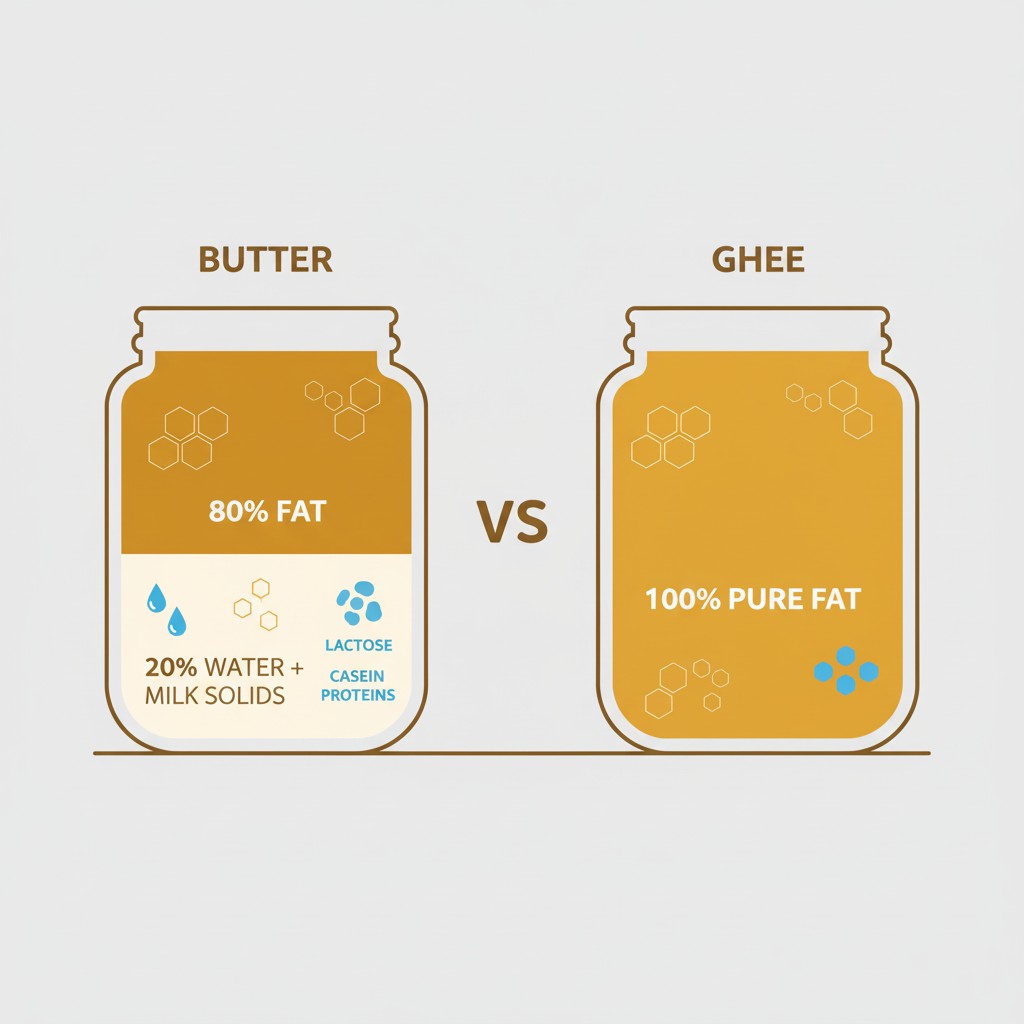
When we look at the fat content, both are different.
Butter – Butter is a classic dairy product made by churning milk until the solid fat separates from the liquid buttermilk. It contains 80% fat and 20% water and milk solids like lactose and casein.
Ghee – Ghee is produced when we heat the butter and remove the 20% non-fat content. The water evaporates, the milk solids are separated, and we get 100% aromatic pure fat—ghee.
Complete Comparison: Ghee vs Butter Across Key Factors
Nutritional Breakdown: What Each Tablespoon Contains
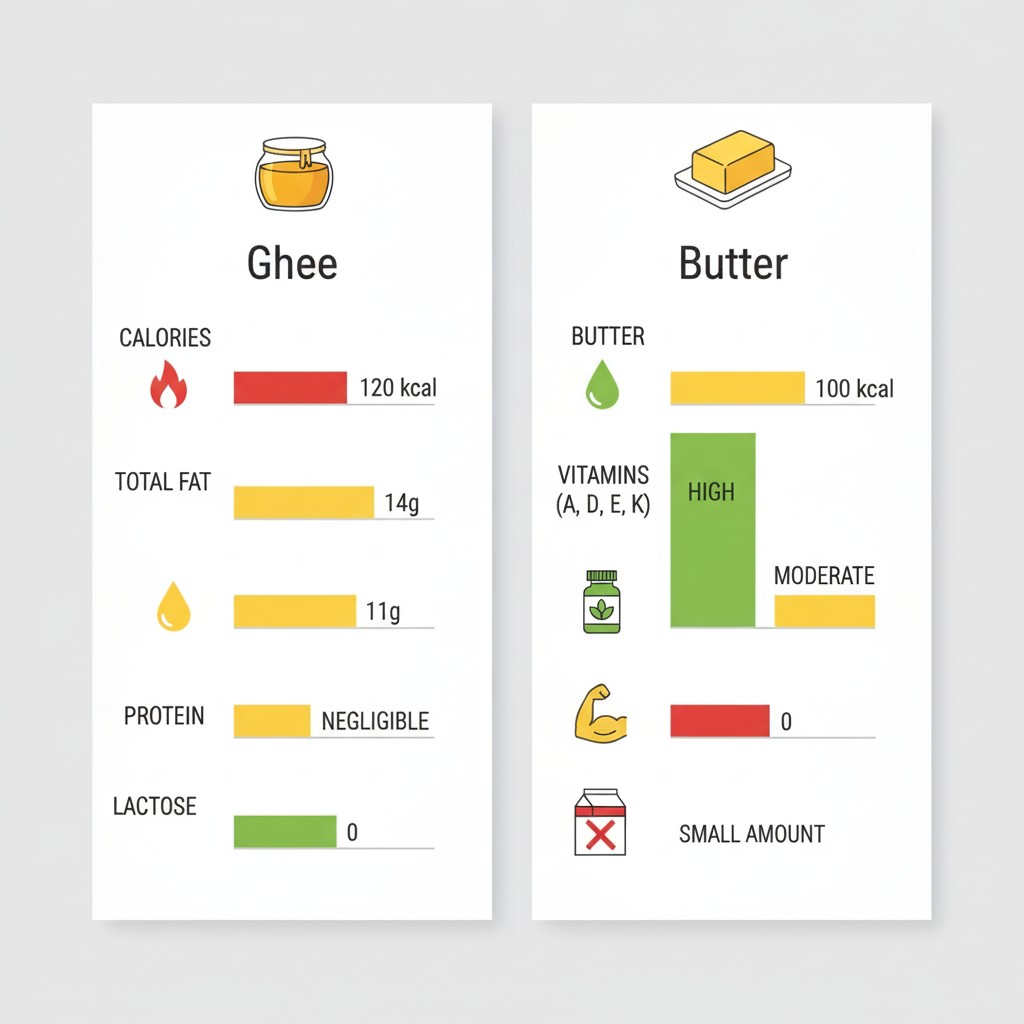
| Nutrient | Ghee (1 tbsp) | Butter (1 tbsp) |
|---|---|---|
| Calories | ~120 kcal | ~100 kcal |
| Total fat | 14 grams | 11 grams |
| Saturated fat | 9 grams | 7 grams |
| Unsaturated fat | 5 grams | 4 grams |
| Carbohydrates | None | None |
| Protein | None | 0.1 grams |
| Cholesterol | 35 mg | 30 mg |
| Lactose/Casein | None | Present |
| Vitamin A | High | Moderate |
| Vitamin D | Moderate | Moderate |
| Vitamin E & K | Present | Present |
Which One Is Easier to Digest?
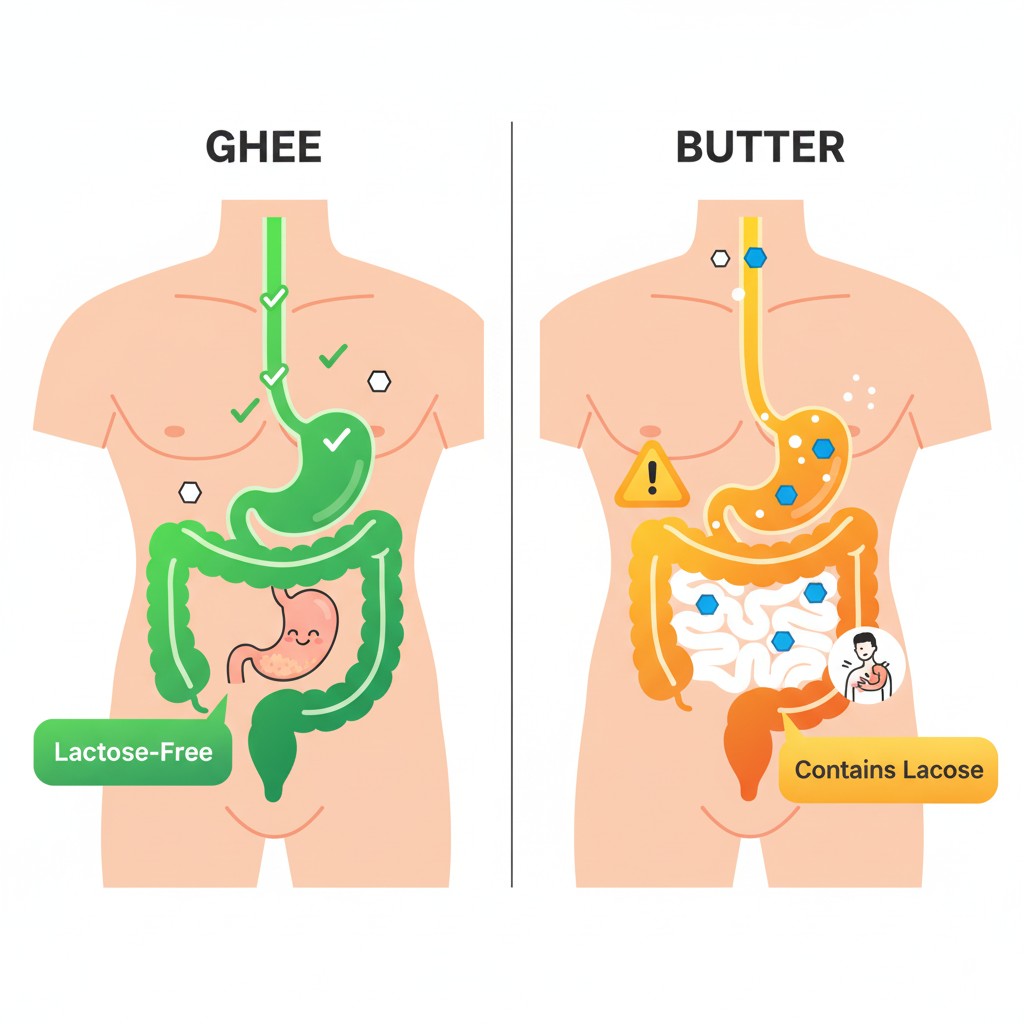
Butter has small amounts of lactose and casein. For people who have lactose sensitivity, they may feel discomfort. For those without dairy sensitivity, it's fine to consume small amounts.
On the other hand, ghee supports smooth digestion and better nutrient absorption in Ayurveda. It is completely lactose-free, so people with lactose intolerance can also consume it without worry.
Healthy Fats Showdown: Ghee's MCTs vs Butter's Omega-3s
Both ghee and butter contain healthy fats that our bodies need for energy, hormone balance, and the absorption of fat-soluble vitamins like A, D, E, and K.
Ghee is the purest form of fat, containing short and medium-chain fatty acids like butyric acid and conjugated linoleic acid (CLA), which support good gut health and reduce inflammation.
Butter also contains essential fatty acids, but it includes water and milk solids. Homemade butter has higher levels of omega-3 fatty acids and antioxidants compared to processed butter. A small amount of butter provides good absorption of essential nutrients in our body.
Smoke Point: Why It Matters for Healthy Cooking
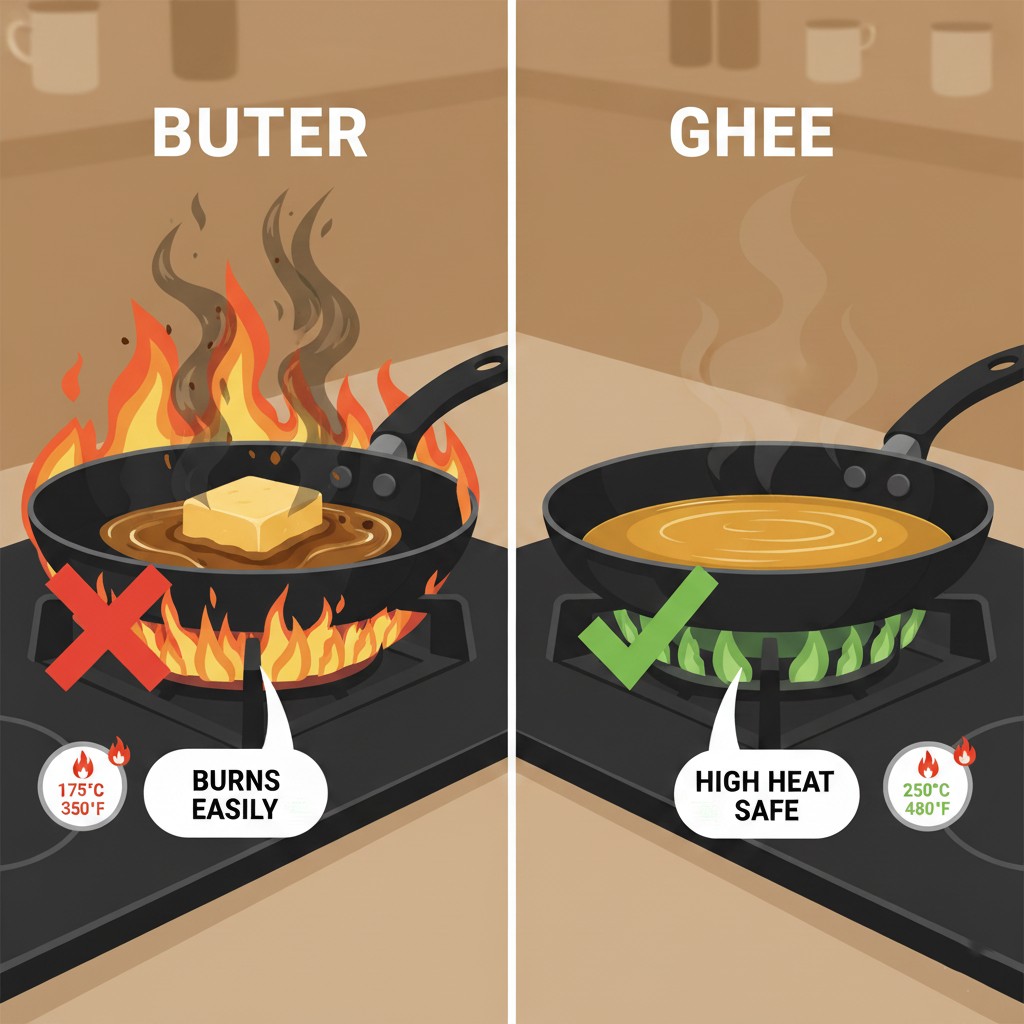
The smoke point plays a vital role in healthy cooking. It's defined as the temperature at which fats start to burn, leading to the production of harmful compounds.
Butter has a lower smoke point of about 175°C (350°F). Cooking with butter over high heat can cause it to burn quickly and produce unhealthy compounds.
Compared to butter, ghee has a significantly higher smoke point, around 250°C (480°F)—making it ideal for cooking over high heat.
Key takeaway: Ghee is ideal for frying, sautéing, and high-heat cooking, while butter is best for low-heat cooking, spreading, or baking.
Heart Health: Can You Safely Eat Ghee and Butter?
Both ghee and butter contain saturated fats, which have been linked to heart concerns. However, modern research suggests that moderate consumption is safe for the heart.
Ghee contains short and medium-chain fatty acids and conjugated linoleic acid (CLA), which support heart health when used in appropriate amounts.
Butter contains small amounts of lactose and casein, which don't directly harm the heart, but excessive consumption can lead to elevated cholesterol levels.
Bottom line: Both ghee and butter are heart-safe when used in moderation.
Which One Supports Weight Management Better?
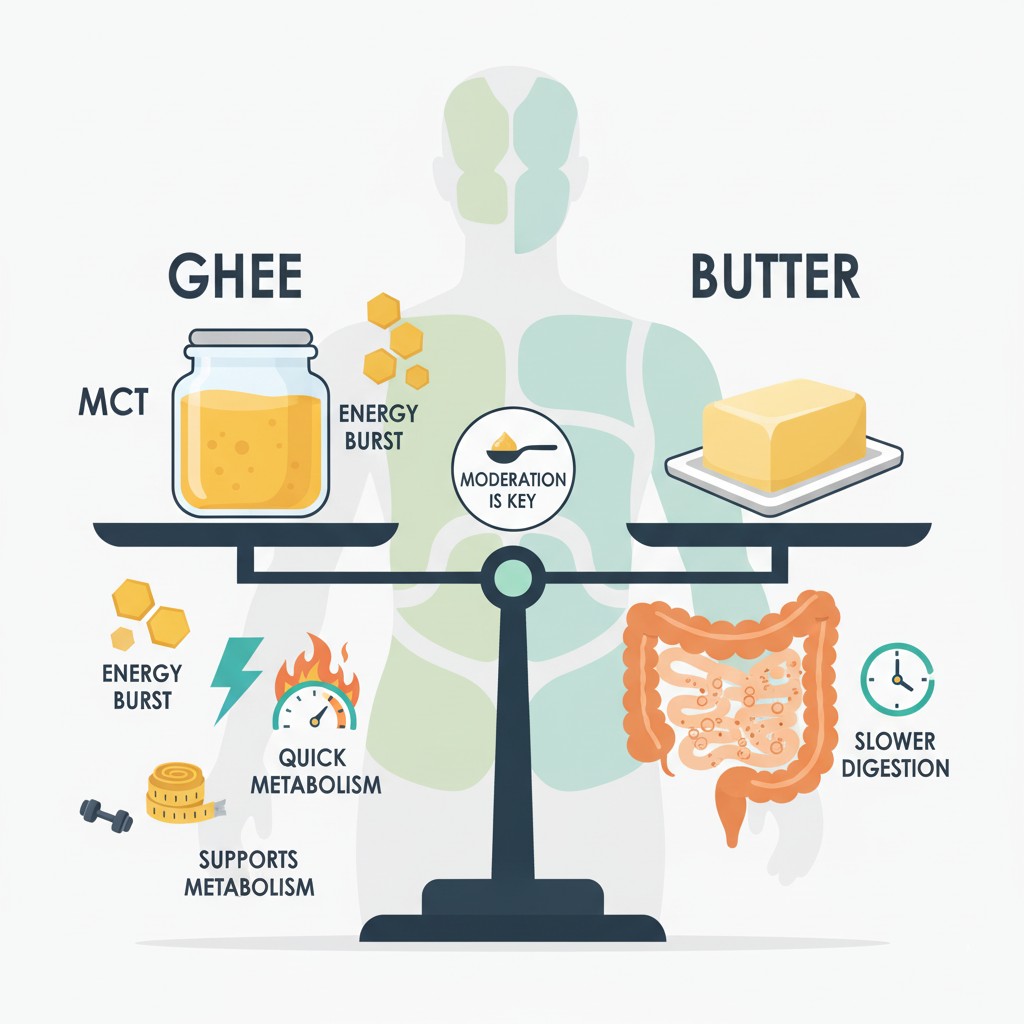
Both butter and ghee are calorie-dense, so consuming them in excess can lead to weight gain. However, in moderation, they can support weight management in different ways.
Ghee contains medium-chain triglycerides (MCTs), which are easily digested and quickly converted to energy rather than stored as fat, while also supporting good gut health.
Butter has essential fatty acids, but due to its milk solids and less concentrated fat content, it doesn't offer the same metabolic benefits as ghee.
Verdict: Ghee is slightly better for weight management than butter, but moderation is key.
Ayurvedic Wisdom: Ghee as Traditional Medicine
For centuries, ghee and butter have been used in traditional healing. From an Ayurvedic perspective, ghee is revered as medicinal. It is believed that ghee can strengthen the immune system, promote glowing skin, lubricate the joints, improve memory, support gut health, reduce inflammation, and even serve as a moisturizer in winter.
While butter doesn't hold the same value in traditional medicine.
Taste Differences
Butter has a smooth, creamy texture and is slightly sweet in taste. So if you want creaminess and a gentle flavor, choose butter.
And ghee has a rich, nutty, and aromatic flavor because of the caramelized milk solids. So, if you want a rich flavor with a beautiful aroma, then choose ghee.
Your Ultimate Guide: When to Use Ghee vs When to Use Butter
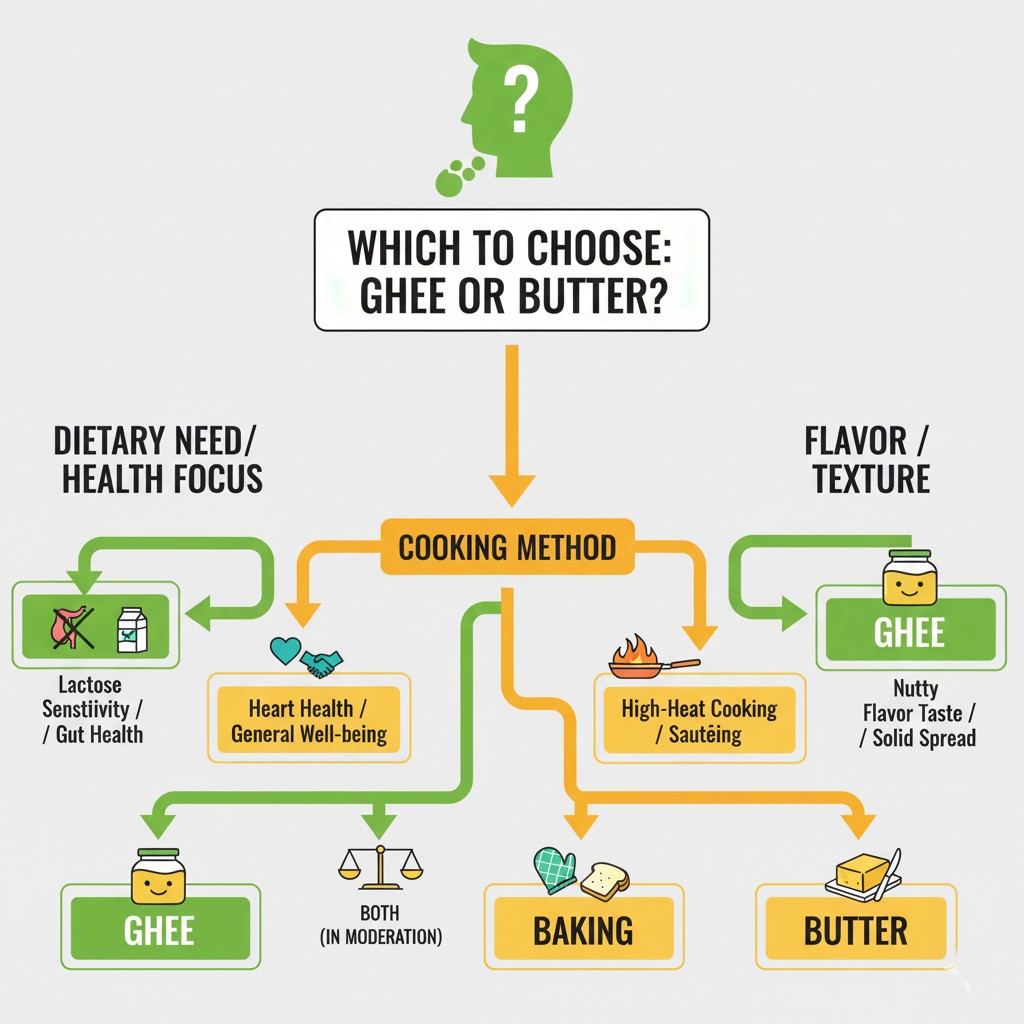
Ghee and butter are both winners. First, you should know your body and then choose according to your preference. Here's a brief guide to make it easy for you:
- ✅ If you are lactose intolerant, then prefer ghee
- ✅ For baking, spreading, or low-heat cooking, use butter
- ✅ For high-heat cooking or frying, use ghee
- ✅ If you are focused on gut health, good digestion, and weight management, then ghee works better
- ✅ If you have heart issues, then you can choose both, but in moderate amounts. It is better to switch to mustard oil or olive oil
How Much You Should Take Daily?
Both butter and ghee are high-calorie dense fats, so use them in very moderate amounts. It is recommended to use 1 to 2 teaspoons (5-10 grams) per day for a balanced diet. Portion control is very important; even a small amount can enhance the flavor and is good for your overall system.
When to Avoid or Limit?
You should avoid or limit both ghee and butter if you have:
- ❌ High triglycerides
- ❌ High cholesterol
- ❌ Fatty liver
- ❌ Obesity
- ❌ High risk of heart diseases
✅ Final Thoughts
Ghee and butter both offer unique health benefits. Your choice should depend on taste preferences and health goals. Since they're high in saturated fats, the key is moderation. 1 to 2 teaspoons daily is enough to enjoy all the nutritional benefits.
Next time, instead of asking which is better, ask what your body needs. Both are valuable additions to a balanced diet—just use them thoughtfully.